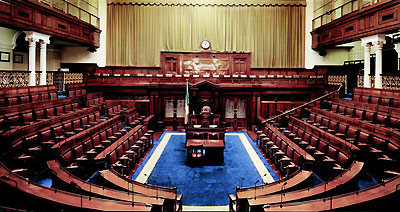In a report that names some of Ireland’s largest universities and colleges, published today by the Dáil’s public accounts committee, serious doubts were raised about the use of state money by Ireland’s higher education institutions.
An issue that has hung over universities and colleges in recent months, the report comes as colleges and universities are increasing the pressure on the government to provide them with more state funding and greater financial autonomy.
The findings of the Dáil Committee of Public Accounts raise serious concerns about the conduct of universities. It criticises several universities for failing to declare tens of millions of euro gained from private trusts and foundations, while also raising concerns about unauthorised severance payments worth hundreds of thousands of euro.
The Irish Times report that the report recommends that any individual who receives severance payments shouldn’t be re-engaged on a contract or by another arrangement. However, the report states that in exceptional circumstances where it is being considered, the Department of Education and Skills or the HEA should be asked for approval.
Some of the most serious concerns relate to widespread non-compliance with procurement rules and significant financial losses linked to mismanagement. The report comes at a bad time for a sector that is in the midst of a campaign for more state funding and state support, with many universities making public their concerns about the lack of state support for the third-level sector.
Several universities and colleges were also accused of misleading the Oireachtas committee. The Higher Education Authority (HEA), the body responsible for regulating the sector, is also criticised – the report calls into question the HEA’s ability, operating with reduced staff numbers and reduced resources, to regulate the sector.
The University of Limerick (UL), NUI Galway, University College Cork (UCC) and Dublin Institute of Technology (DIT), as well as Waterford Institute of Technology (WIT) and Cork Institute of Technology (CIT), are all named in the report and are criticised by the Dáil committee.
Both NUIG and the National College of Art and Design (IADT) are criticised for their failure to provide up-to-date accounts, with delays of two and three years respectively. One particular concern the report raises is the potential conflicts of interest among senior staff in universities and colleges who are shareholders in university spin-out companies.
The report is the next step in a mini-crisis that began after a special report broadcasted by RTÉ revealed the level of financial mismanagement in certain higher education institutions in Ireland.
UL has been at the centre of the criticism – the college had previously told the committee that six-figure severance packages were paid to two staff. However, the college re-employed the two individuals as consultants for a further two years.
The report has recommended that universities be required to declare all income from trusts and foundations after institutions withheld information from the committee. Other third-level institutions may be implicated, the report notes, as some accounts were not examined in detail.
Advocating a need for a stricter approach to commercialising intellectual property and income generated from spin-off enterprises, the report recommended that education authorities introduce new policies to address this.
The report examines the need for the HEA to be properly resourced and given greater ability to hold the sector to account, as well as the potential for penalties against colleges that breach laws or other regulations.
The Irish Times reported that a spokesman for Minister for Education and Skills, Richard Bruton, said the HEA and Department of Education and Skills have been working together to improve higher education governance and that an independent review of governance has already been established in UL.







